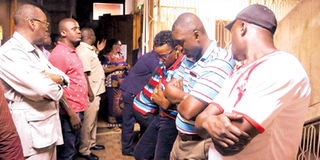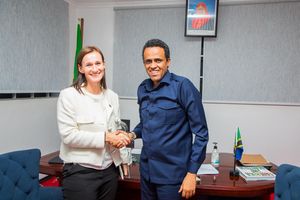Ukawa: Can the centre hold as house shakes?

Disgruntled senior members of the main opposition Chadema led by the party’s national chairman Freeman Mbowe (left) seeking audience with the National Electoral Commission (NEC) leadership in Dar es Salaam last week. PHOTO I FILE
What you need to know:
- The main opposition Chadema has refused to acknowledge the result and accuses the ruling party of abusing state machinery to grab the two seats, accusations that CCM has dismissed.
Dar es Salaam. Following the ruling party CCM’s victory in the Kinondoni and Siha parliamentary by-elections at the weekend, the country’s opposition has once again found itself facing unchartered waters that could further extend its period of uncertainty.
The main opposition Chadema has refused to acknowledge the result and accuses the ruling party of abusing state machinery to grab the two seats, accusations that CCM has dismissed.
Touted by some as the best hope for the opposition to regain its glory, but by others as a big gamble, last weekend’s by-elections have left the opposition at yet another crossroads.
Political analysts have said the opposition faces a Herculean task taking on the more resilient, increasingly powerful CCM, which made a shock comeback in the 2015 General Election at the very moment many had thought it was over.
And as things continue falling apart for the opposition at a time the ruling party is riding on cloud nine, talk has once again shifted to the critical question: what next?
Granted, the challenges ahead are still wide and varied.
1. Coalition headache
A broader alliance for the opposition could be one of the few viable options that remain, but will the parties ever agree on anything fruitful? Posterity will tell.
The lack of a common ground, apparently, is just one of the plethora of hurdles the opposition faces going forward.
Getting all the players to agree on one thing proved a hard nut to crack ahead of the 2015 elections. At the end, it was the tale of a troubled house with some major players quitting the alliance.
But after the weekend loss, revisiting the idea remains a practical option, analysts have said.
Dr Richard Mbunda, a political science lecturer at the University of Dar es Salaam (UDSM), says: “They have to go the same way as 2015, unless they move with the same spirit, select a young politician with wider, nothing is going to change.”
2. Disillusioned voters
Analysts say the poor voter turnout that was witnessed in what is generally perceived as an opposition stronghold is a telltale sign of bigger issues to come. It leaves the opposition with the Herculean task of mobilising disillusioned urban voters.
Out of 264,055 registered voters in Kinondoni constituency, only 45,454 turned up to cast their ballot. The CCM candidate, Maulid Mtulia garnered 30,241 votes while the main opposition challenger Salum Mwalimu (Chadema) went home with 12,353.
Dr Hamad Salim, a political analyst at the University of Dar es Salaam, says there are various factors that might have contributed to the low voter turnout.
“Low voter turnout could have been triggered by defecting leaders joining the ruling party. They feel betrayed,” he says.
“But there is also the security issue that may have forced many to stay indoors, especially after the shooting of the student.”
3. Electoral reforms
The opposition had initially decided to boycott the election before making a controversial U-turn. The main reason for not wanting to participate was its unmet demands for electoral reforms – especially calls for the independence of the National Electoral Commission (NEC).
That challenge remains. To continue or not continue under the circumstances – that is the tricky question the opposition now faces.
Dr Salim says: “Their decision to participate before the reforms were made indicates how unstable the opposition seems to be.”
4. Defections
There is also a general feeling that after CCM made good on what is widely believed to be its golden pledge to return the seats to the two high-profile defectors, this could just be the beginning of opposition defections.
Dr Mbunda believes more trouble looms for the opposition.
“The opposition has a huge mountain to climb here; this trend of defections does not portend any good for them, but it will continue favouring the flourishing ruling party,” he says. “So, unless there is a proper strategy on the way forward, this will go on and on as more opposition leaders convince themselves that it’s the way to go.”
5. Housekeeping issues
There is also consensus among political analysts that any strategy the opposition comes up with, as a broader alliance, should begin with addressing the curse of personal interests.
“If they want to challenge the ruling party in the 2020 General Election, they must address personal interests within the coalition and agree on one strong political party, and one candidate backed by all,” Dr Mbunda notes.
He suggests that challenging a rejuvenated CCM will not be a walk through the park, noting the opposition may have to “rebuild Ukawa”.
Abeid Juma, a political science lecturer at Mzumbe University, says the issue of nominating candidates needs to be addressed too.
“In Kinondoni, the opposition nominated a candidate who was not a resident, and some of their followers were talking about it. Salum registered himself as a voter in Zanzibar,” he says.
Going forward, “the opposition must plan to make things right before it is too late,” he reiterates.




